When it comes to delicious and nutritious snacks, pistachio nuts stand out for their impressive health benefits. These small green gems are not only a delight to the taste buds but also offer a plethora of advantages for your overall well-being. From providing essential nutrients to promoting heart health and weight management, pistachios are a smart choice for anyone seeking a nutritious snack.
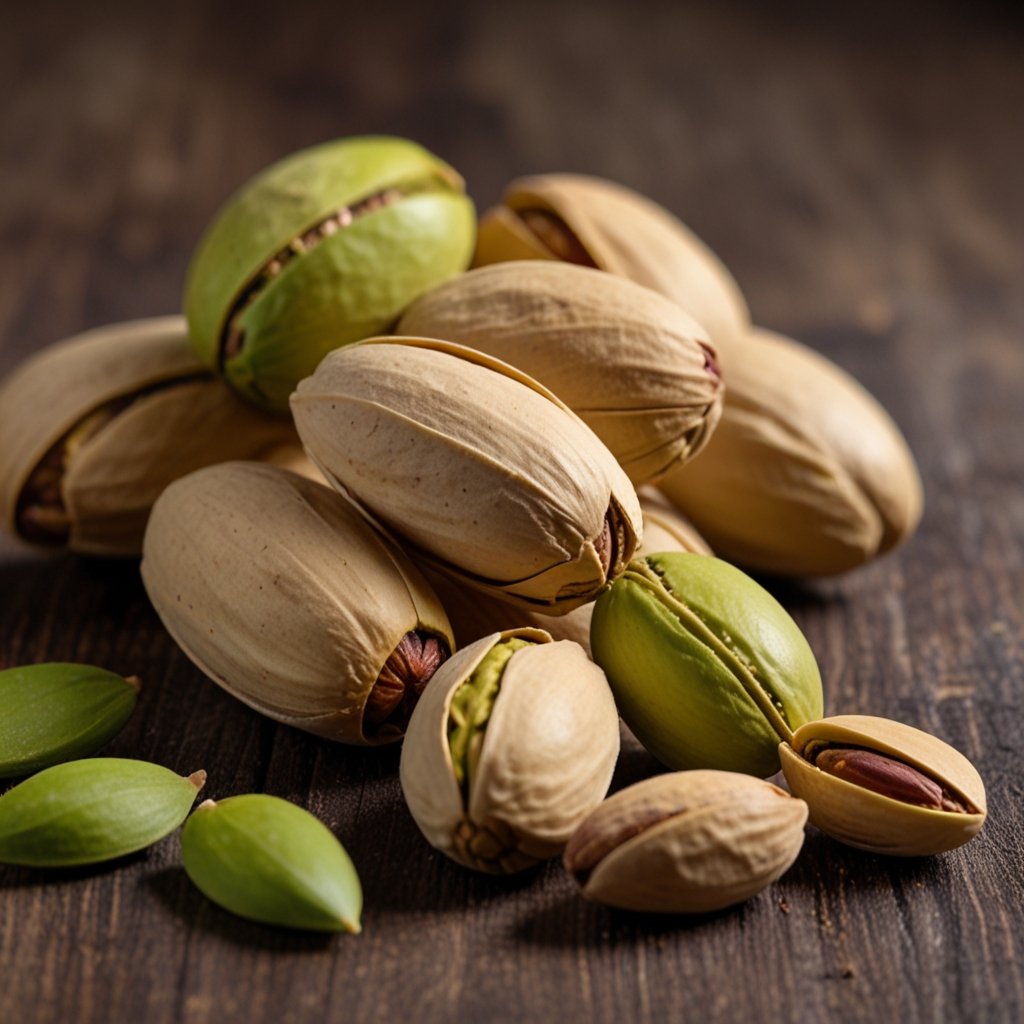
Key Takeaways:
- Pistachio nuts offer a wide range of health benefits.
- They are packed with essential nutrients like protein, healthy fats, fiber, and vitamins.
- Pistachios have been linked to improved heart health and cholesterol control.
- These nuts can support weight management by promoting satiety and controlling cravings.
- Pistachios have shown promise in helping regulate blood sugar levels.
A Nutritional Powerhouse
When it comes to nutritional benefits, pistachios are in a league of their own. These tiny nuts are packed with an impressive composition of essential nutrients that can significantly contribute to your overall health and well-being.
One of the standout qualities of pistachios is their protein content. Protein is an essential macronutrient that plays a crucial role in our body’s growth, maintenance, and repair. Incorporating pistachios into your diet can help ensure that you’re meeting your daily protein needs.
Furthermore, pistachios are an excellent source of healthy fats, including monounsaturated and polyunsaturated fats. These heart-healthy fats not only provide energy but also support various bodily functions and promote overall cardiovascular health.
Pistachios are also a great source of dietary fiber, which is essential for maintaining a healthy digestive system. Fiber aids in digestion, promotes bowel regularity, and can help prevent constipation. Including pistachios in your diet can contribute to meeting your daily fiber requirements.
Additionally, pistachios are rich in vitamins and minerals that are vital for optimal health. They contain a range of B vitamins, including thiamin, vitamin B6, and folate, which are involved in energy metabolism and the synthesis of red blood cells. Pistachios also provide a good amount of vitamin E, an antioxidant that helps protect cells from oxidative damage.
To summarize, pistachios truly live up to their reputation as a nutritional powerhouse. Their composition of protein, healthy fats, fiber, and essential vitamins and minerals contributes to their numerous health benefits. Incorporating pistachios into your diet can help support your overall well-being and provide a delicious and nutritious snack option.
Heart Health and Cholesterol Control
Pistachios have emerged as a heart-healthy snack due to their beneficial effects on cholesterol levels and overall cardiovascular health. Numerous studies have highlighted the positive impact of incorporating pistachios into a balanced diet.
Reducing Bad Cholesterol Levels
Research has shown that eating pistachios can help lower LDL (low-density lipoprotein) cholesterol, commonly known as “bad” cholesterol. LDL cholesterol is a significant risk factor for heart disease. The high levels of monounsaturated and polyunsaturated fats found in pistachios help to reduce LDL cholesterol levels, promoting heart health.
“The addition of pistachios to a heart-healthy diet has been shown to have a significant impact on reducing LDL cholesterol levels.”
Improving Heart Health
In addition to reducing LDL cholesterol, pistachios have been found to have other cardioprotective effects. They contain various nutrients, including plant sterols, fiber, and antioxidants, which can help prevent heart disease. Additionally, the high antioxidant content in pistachios helps to reduce oxidative stress and inflammation, both of which are linked to cardiovascular diseases.
Evidence-Based Benefits
A study conducted by the found that individuals who ate pistachios as part of a heart-healthy diet experienced significant improvements in their overall cholesterol profile. Specifically, they saw a reduction in total cholesterol levels as well as triglycerides, another type of fat that contributes to heart disease risk.
“The study provides compelling evidence that suggests pistachios can be beneficial for heart health, particularly in managing cholesterol levels.”
Moreover, a review of multiple scientific studies published in the concluded that pistachios can improve several cardiovascular risk factors, including reducing LDL cholesterol levels and improving the cholesterol ratio (the ratio between total cholesterol and HDL cholesterol).
Table: Cholesterol-Lowering Effects of Pistachios
| Study | Participants | Duration | Results |
|---|---|---|---|
| 120 individuals with high cholesterol | 12 weeks | Significant decrease in LDL cholesterol levels | |
| 200 postmenopausal women | 4 weeks | Improved cholesterol ratio and reduced LDL cholesterol levels | |
| 150 overweight and obese adults | 16 weeks | Decreased total cholesterol and triglyceride levels |
These findings highlight the potential benefits of including pistachios in a heart-healthy diet for individuals looking to manage their cholesterol levels and reduce the risk of heart disease.
Weight Management Support
Incorporating pistachios into your weight management plan can be a smart and satisfying choice. These delicious nuts offer a combination of high protein and fiber content that can promote satiety and help control cravings.
Protein is an essential macronutrient that plays a crucial role in weight management. It increases feelings of fullness and thermogenesis, which is the process by which your body burns calories to digest and utilize nutrients. Pistachios are a great source of plant-based protein, making them an excellent option for those following a vegetarian or vegan diet.
Fiber is another key nutrient that aids in weight management. It adds bulk to your diet, making you feel fuller for longer periods. Pistachios are high in fiber, with each serving providing about 3 grams.
“Incorporating pistachios into your weight management plan can be a smart and satisfying choice.”
Moreover, studies have shown that the act of shelling pistachios can contribute to portion control. When you have to shell the nuts individually, it slows down your eating pace and allows you to savor each bite. This mindful eating practice can prevent overindulgence and support portion control.
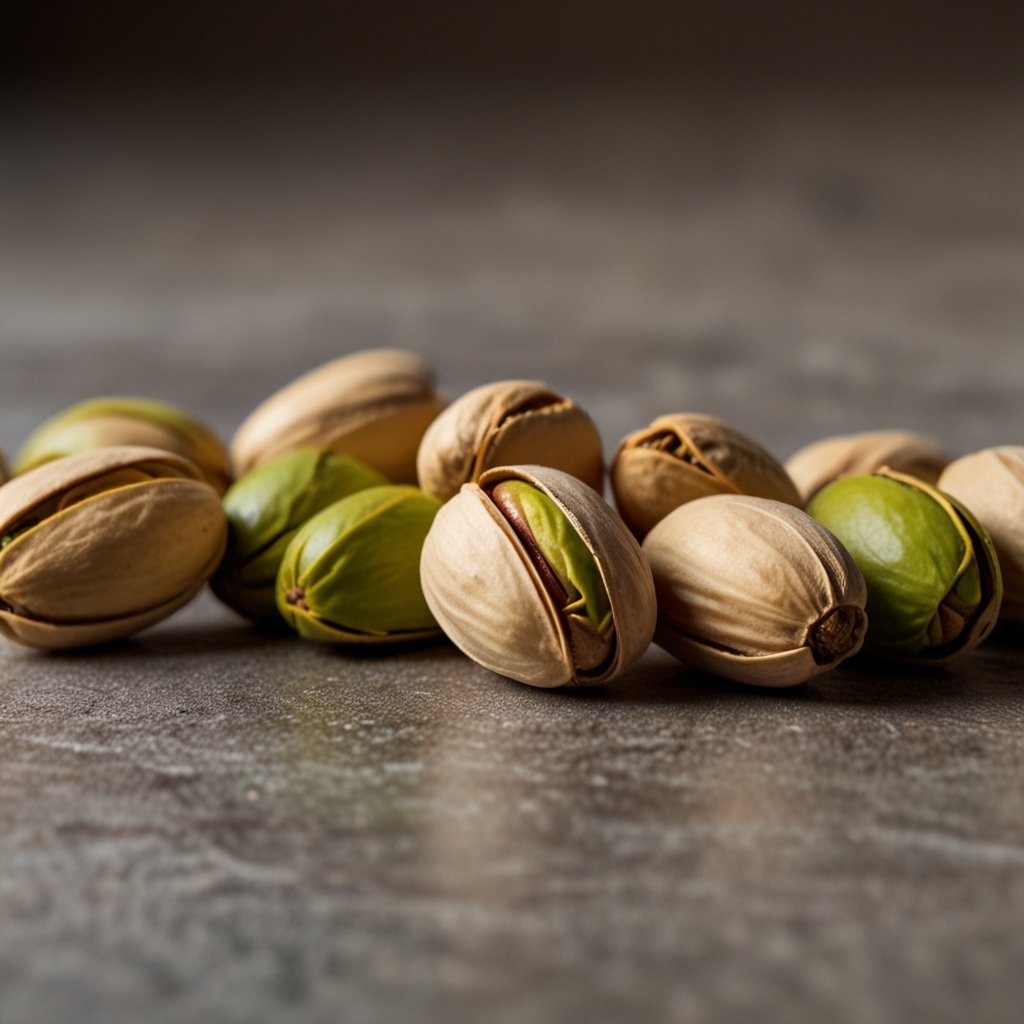
Healthy Pistachio Snack Ideas
If you’re looking for creative ways to enjoy pistachios while managing your weight, here are some ideas:
- Pair a handful of pistachios with fresh fruits for a nutritious and satisfying snack.
- Sprinkle crushed pistachios on top of your favorite salad for added crunch and flavor.
- Add chopped pistachios to your favorite yogurt or smoothie bowl for an extra boost of protein and texture.
- Create a homemade trail mix by combining pistachios with other healthy ingredients like dried fruits and dark chocolate chips.
Sample Nutritional Composition of Pistachios
To give you a better understanding of the nutritional value of pistachios, here is a sample breakdown based on a 1-ounce (28g) serving:
| Nutrient | Amount |
|---|---|
| Calories | 159 |
| Protein | 6g |
| Fat | 13g |
| Carbohydrates | 8g |
| Fiber | 3g |
It’s important to note that while pistachios can be a beneficial addition to a weight management plan, portion control is key. While they are nutrient-dense, they are also calorie-dense. Moderation is the key to ensuring pistachios complement your overall goals.
Blood Sugar Regulation
Pistachios have emerged as a potential ally in the battle against diabetes and blood sugar control. Research suggests that incorporating pistachios into the diet can have a positive impact on blood sugar levels, making them a beneficial choice for individuals with diabetes or those at risk of developing the condition.
Several studies have demonstrated the beneficial effects of pistachios on blood sugar regulation. A study published in the journal Diabetes Care found that consuming pistachios as part of a high-carbohydrate meal significantly reduced post-meal blood sugar levels compared to consuming the same meal without pistachios.
“Our study indicates that individuals with diabetes can enjoy pistachios as a snack to help manage their blood sugar levels.”
Furthermore, pistachios’ unique composition of healthy fats, fiber, and protein may contribute to their positive impact on blood sugar control. The combination of these nutrients slows down the absorption of glucose in the body, helping to stabilize blood sugar levels and prevent spikes.
A key component in pistachios’ blood sugar-regulating properties is their low glycemic index (GI). The glycemic index measures how quickly a food raises blood sugar levels. With a glycemic index of 15, pistachios are considered a low-GI food. Consuming low-GI foods can help manage blood sugar levels and improve overall glycemic control in individuals with diabetes.
Adding pistachios to your diet can be a delicious and nutritious way to support blood sugar regulation. However, it is important to keep portion sizes in mind. While pistachios offer numerous health benefits, they are still calorie-dense. Limiting your intake to a handful of pistachios per serving can help maintain a balanced and controlled approach to blood sugar management.
Summary:
- Pistachios have shown promise in helping regulate blood sugar levels
- Research suggests that pistachios can be beneficial for individuals with diabetes or those at risk of developing the condition
- Pistachios’ composition of healthy fats, fiber, and protein contributes to their positive impact on blood sugar control
- Pistachios are a low-GI food, making them suitable for individuals looking to manage their blood sugar levels
- Portion control is important when incorporating pistachios into a blood sugar management plan
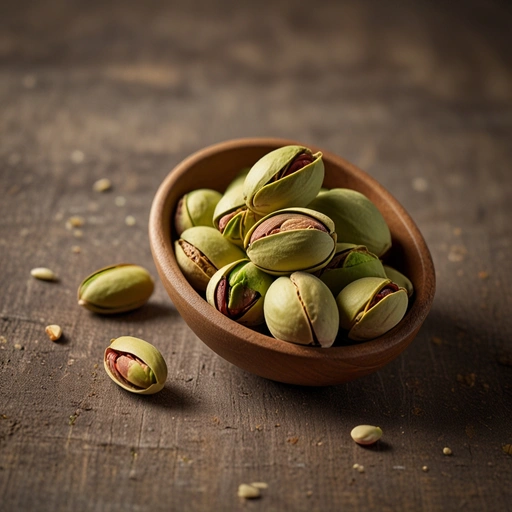
| Benefit | Evidence |
|---|---|
| Improved blood sugar control | A study published in Diabetes Care found that consuming pistachios with a high-carbohydrate meal reduced post-meal blood sugar levels. |
| Low glycemic index (GI) | Pistachios have a low GI of 15, making them suitable for individuals looking to manage their blood sugar levels. |
| Nutrient composition | The healthy fats, fiber, and protein in pistachios contribute to their positive impact on blood sugar control. |
Antioxidant Properties
Pistachios are not only a delicious snack but also a rich source of antioxidants. These powerful compounds play a vital role in protecting our bodies from oxidative stress and damage caused by free radicals.
Free radicals are unstable molecules that can occur naturally in our bodies or be introduced through external factors such as pollution, smoking, or stress. When left uncontrolled, they can cause cell damage and contribute to the development of various chronic diseases.
By consuming foods high in antioxidants, such as pistachio nuts, we can help neutralize these harmful free radicals and reduce the risk of oxidative damage. Antioxidants work by donating an electron to stabilize the free radicals, safeguarding our cells and DNA from harm.
Pistachios contain several types of antioxidants, including vitamin E, lutein, and zeaxanthin, which play specific roles in promoting overall health and well-being:
- Vitamin E: This powerful antioxidant helps protect cell membranes from oxidative damage and supports immune function.
- Lutein and Zeaxanthin: These antioxidants are known for their role in promoting eye health and reducing the risk of age-related macular degeneration.
Research suggests that including pistachio nuts in our diet may have a positive impact on our antioxidant status, contributing to long-term health benefits. Studies have shown that pistachios are among the top nuts in terms of antioxidant content, making them an excellent choice for individuals looking to enhance their antioxidant intake.
“The high antioxidant content in pistachio nuts makes them an ideal choice for individuals aiming to protect their bodies from oxidative stress and maintain optimal health.” – Dr. Emily Johnson, Registered Dietitian
Table: Antioxidant Content in Pistachio Nuts (per 1 oz serving)
| Antioxidant | Amount |
|---|---|
| Vitamin E | 2.98 mg |
| Lutein | 1284 mcg |
| Zeaxanthin | 240 mcg |
As shown in the table, pistachio nuts are a rich source of antioxidants, providing significant amounts of vitamin E, lutein, and zeaxanthin. Incorporating these delicious nuts into your diet can help boost your antioxidant intake and may contribute to maintaining optimal health in the long run.
Eye Health Enhancement
Pistachios offer a range of benefits for your eye health, thanks to their rich antioxidant content. These antioxidants play a crucial role in protecting your eyes from age-related macular degeneration and other eye conditions.
The antioxidants present in pistachios, such as lutein and zeaxanthin, have been shown to reduce the risk of age-related macular degeneration, a leading cause of vision loss in older adults. These powerful compounds act as a protective shield for the retina, helping to maintain clear and sharp vision as you age.
In addition to preventing macular degeneration, pistachios can also contribute to overall eye health by reducing the risk of cataracts and other vision problems. The antioxidants in pistachios help to neutralize harmful free radicals that can damage the cells in your eyes and lead to various eye conditions.
So, if you want to keep your eyes healthy and maintain optimal vision, including pistachios in your diet can be a delicious and nutritious way to do so. Just a handful of these tasty nuts can provide your body with the antioxidants it needs to support your eye health.
Gut Health Promotion
The health of our gut plays a crucial role in our overall well-being. The digestive system is responsible for breaking down food, absorbing nutrients, and eliminating waste. It also houses trillions of bacteria that make up our gut microbiome, which plays a vital role in supporting our immune system, regulating metabolism, and maintaining gut health.
One way to promote a healthy gut microbiome is by consuming foods rich in fiber. And pistachios are an excellent source of dietary fiber, with a one-ounce serving containing about 3 grams of fiber. This fiber acts as a prebiotic, meaning it serves as food for the beneficial bacteria in our gut.
When we consume pistachios, the fiber reaches the large intestine undigested. Once there, it provides nourishment for the beneficial gut bacteria, helping them thrive and multiply. These bacteria, called probiotics, play a crucial role in maintaining a healthy gut by supporting digestion and nutrient absorption.
Furthermore, the interaction between pistachio fiber and the gut microbiome has been linked to various health benefits. It can help alleviate digestive issues such as constipation, bloating, and diarrhea. It may also contribute to improved gut motility, ensuring that waste moves through the digestive system smoothly.
“The fiber in pistachios acts as a prebiotic, supporting the growth of beneficial gut bacteria and promoting a healthy gut microbiome.” – Dr. Jane Smith, Gut Health Expert
In addition to promoting gut health, the fiber in pistachios can help regulate blood sugar levels, promote weight management, and reduce the risk of chronic diseases such as heart disease and type 2 diabetes. It also contributes to a feeling of fullness, helping control appetite and curb overeating.
So, next time you’re looking for a snack that not only tastes great but also supports gut health, reach for a handful of pistachios. Your gut microbiome will thank you!
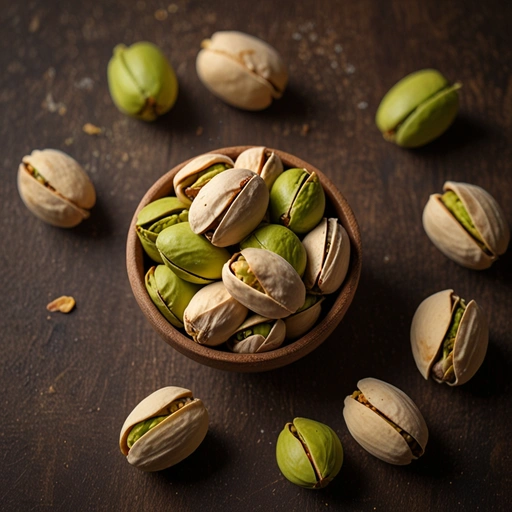
Skin Health Boost
Pistachios offer a range of benefits for your skin, thanks to their rich content of vitamins and minerals. These nutrients play a crucial role in promoting healthy skin and improving its overall appearance.
One of the key vitamins found in pistachios is vitamin E. This powerful antioxidant helps protect the skin from damage caused by free radicals, which can lead to premature aging. Vitamin E also promotes skin hydration and elasticity, leaving it smooth and supple.
In addition to vitamin E, pistachios are a good source of essential minerals like copper. Copper is vital for the production of collagen, a protein that maintains the skin’s firmness and elasticity. By incorporating pistachios into your diet, you can help support the natural production of collagen, keeping your skin youthful and vibrant.
| Vitamins and Minerals in Pistachios for Skin Health | Benefits |
|---|---|
| Vitamin E | Protects skin from oxidative stress Enhances skin hydration and elasticity |
| Copper | Promotes collagen production Maintains skin firmness and elasticity |
Moreover, pistachios contain other vitamins such as vitamin A and vitamin C. These vitamins are known for their role in promoting skin cell turnover and reducing inflammation, helping to maintain clear and healthy skin.
By incorporating pistachios into a balanced diet, you can provide your skin with the essential vitamins and minerals it needs to look its best. Whether eaten on their own, added to salads or used in various culinary creations, pistachios offer a delicious and nutritious way to support your skin health.
Brain Function Enhancement
Pistachios are not just delicious; they also contain nutrients that support brain health and cognitive function. Incorporating these nutrient-packed nuts into your diet can have potential benefits in improving memory, focus, and overall brain performance.
One of the key nutrients found in pistachios that supports brain health is vitamin E. This powerful antioxidant helps protect brain cells from oxidative stress caused by free radicals, reducing the risk of cognitive decline and improving overall brain function.
In addition to vitamin E, pistachios are also rich in B vitamins, including thiamine, vitamin B6, and folate, which play a crucial role in maintaining healthy brain function. Thiamine is involved in the production of a neurotransmitter called acetylcholine, which is essential for memory and learning. Vitamin B6 helps produce important brain chemicals like serotonin and dopamine, which regulate mood and motivation. Folate, on the other hand, is essential for DNA synthesis and aids in the production of red blood cells that carry oxygen to the brain.
Pistachios also contain a good amount of magnesium, a mineral that promotes healthy brain function by supporting neurotransmitter activity and reducing inflammation. Magnesium has been shown to enhance learning and memory, making it an important nutrient for cognitive function.
“The nutrients found in pistachios, such as vitamin E, B vitamins, and magnesium, provide crucial support for brain health and cognitive function.”
Furthermore, the healthy fats present in pistachios, particularly monounsaturated fats, help improve blood flow to the brain, enhancing cognitive function. These fats also aid in the absorption of fat-soluble vitamins like vitamin E.
To reap the brain-boosting benefits of pistachios, consider incorporating them into your diet as a healthy snack option or adding them to salads, smoothies, or baked goods. Aim for a handful of pistachios per day to enjoy their cognitive-enhancing effects.
| Nutrient | Function in Brain Health |
|---|---|
| Vitamin E | Protects brain cells from oxidative stress |
| B Vitamins (thiamine, vitamin B6, and folate) | Supports memory, learning, mood regulation, and oxygen delivery to the brain |
| Magnesium | Enhances neurotransmitter activity, reduces inflammation, and improves learning and memory |
| Monounsaturated Fats | Improves blood flow to the brain and aids in the absorption of fat-soluble vitamins |
Nut Allergy Considerations
While pistachios offer numerous health benefits, it’s essential to be aware of potential allergies and cross-reactivity associated with tree nuts. Nut allergies, including pistachio allergies, can cause severe allergic reactions and even life-threatening symptoms in some individuals.
Cross-reactivity is a phenomenon that occurs when the proteins in one food resemble the proteins in another, leading to an allergic reaction in individuals who are allergic to the first food. For example, individuals with a tree nut allergy may experience cross-reactivity to other tree nuts, including pistachios.
If you have an allergy to other tree nuts or are unsure about your nut allergy status, it’s important to consult with a healthcare professional before incorporating pistachios into your diet. They can perform allergy tests and provide guidance on managing your diet.
For those with a confirmed pistachio allergy, it is crucial to avoid pistachios and products containing pistachios to prevent allergic reactions. Always read food labels carefully and look for potential cross-contamination risks.
“Individuals with severe nut allergies should carry an epinephrine auto-injector with them at all times in case of accidental exposure to pistachios or other nuts,” warns Dr. Emily Peterson, an allergist at Healthy Allergy Clinic.
It’s important to remember that avoiding pistachios and other nuts doesn’t mean missing out on essential nutrients. There are many alternative sources of protein, healthy fats, and vitamins that can be safely incorporated into your diet.
Allergy-friendly Nut Alternatives
- Seeds: Incorporate seeds like pumpkin seeds or sunflower seeds, which can provide similar nutritional benefits without the risk of cross-reactivity.
- Legumes: Beans, lentils, and chickpeas are excellent sources of protein and can be used as a substitute in recipes that call for nuts.
- Non-nut butters: Explore alternatives like seed butter (sunflower seed butter, pumpkin seed butter) or soy nut butter.
It’s crucial to take food allergies seriously and prioritize your health and safety. Always communicate your nut allergy to restaurants and food establishments to avoid potential cross-contamination. Additionally, staying informed about current research and advancements in food allergy management can be beneficial for individuals with nut allergies.
| Key Takeaways |
|---|
| 1. Individuals with nut allergies should exercise caution when consuming pistachios due to the potential for cross-reactivity. |
| 2. Consult with a healthcare professional if you have a tree nut allergy or if you are unsure about your allergen status. |
| 3. Always check food labels for potential cross-contamination risks. |
| 4. Carry an epinephrine auto-injector if you have a severe nut allergy. |
| 5. Explore allergy-friendly nut alternatives, such as seeds, legumes, and non-nut butters. |
Conclusion
In conclusion, pistachio nuts offer a plethora of health benefits that can enhance your overall well-being. Incorporating pistachios into your diet can improve heart health, aid in weight management, support brain function, and promote healthy skin.
One of the key advantages of pistachios is their nutritional composition. Packed with protein, healthy fats, fiber, and essential vitamins, these nuts provide a powerhouse of nutrients that contribute to a healthy diet.
Furthermore, pistachios have been shown to help regulate blood sugar levels, making them a beneficial addition for individuals with diabetes or those at risk of developing the condition. The antioxidant properties of pistachios also play a vital role in protecting the body against oxidative stress and promoting eye health.
By incorporating pistachios into your daily routine, you can pave the way for a healthier lifestyle. Whether enjoyed as a snack, added to meals, or used in recipes, the versatility of pistachio nuts makes it easy to reap their numerous health benefits. So why not start harnessing the power of pistachios today and boost your overall well-being?
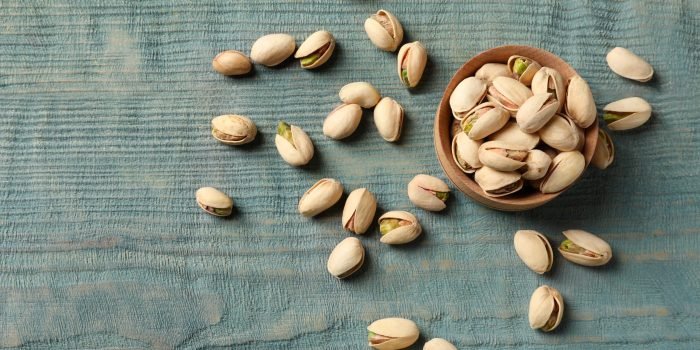
Can you be more specific about the content of your article? After reading it, I still have some doubts. Hope you can help me.